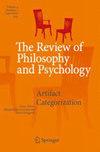部分第一人称权威:我们如何知道自己的情绪
IF 1.8
Q2 PSYCHOLOGY, MULTIDISCIPLINARY
引用次数: 0
摘要
摘要本文主要研究情绪的自我认知。我首先认为,自我认识的几个主要理论,包括透明度方法(见,例如,Byrne 2018)和新表现主义(见,例如,Bar-On 2004),很难解释我们如何权威地了解自己的情绪(即使它们可能合理地解释感觉、信仰、意图和欲望)。接下来我考虑巴雷特(2017a)的经验建构情绪理论。虽然我同意她的观点,即我们“赋予[我们]当前的感觉以意义”(2017a,第26页),但我不同意她的观点,即我们构建自己的情感,因为这有一些不受欢迎的含义。然后,我利用情感科学文献中的最新数据,提出了一种我称之为部分第一人称权威的观点。根据这一观点,第一人称对我们情感的权威只是部分的:我们可以内省并权威地了解自己的感觉和信仰,而其他人却做不到;但我们仍然需要解释这些感觉和信念,来了解我们的情绪。最后,我考虑Carruthers(2011)和Cassam(2014)对自我认识的自我解释。我认为,虽然这些说法在应用于信仰、欲望和意图时是不可信的,但在应用于我们的情感时却更加可信。本文章由计算机程序翻译,如有差异,请以英文原文为准。
Partial First-Person Authority: How We Know Our Own Emotions
Abstract This paper focuses on the self-knowledge of emotions. I first argue that several of the leading theories of self-knowledge, including the transparency method (see, e.g., Byrne 2018) and neo-expressivism (see, e.g., Bar-On 2004), have difficulties explaining how we authoritatively know our own emotions (even though they may plausibly account for sensation, belief, intention, and desire). I next consider Barrett’s (2017a) empirically informed theory of constructed emotion . While I agree with her that we ‘give meaning to [our] present sensations’ (2017a, p.26), I disagree with her that we construct our emotions, as this has some unwelcome implications. I then draw upon recent data from the science of emotions literature to advance a view I call partial first-person authority. According to this view, first-person authority with respect to our emotions is only partial: we can introspect and authoritatively know our own sensations, and beliefs, in ways others cannot; but we still need to interpret those sensations and beliefs, to know our emotions. Finally, I consider self-interpretational accounts of self-knowledge by Carruthers (2011) and Cassam (2014). I argue that while these accounts are implausible when applied to beliefs, desires, and intentions, they are more plausible when applied to our emotions.
求助全文
通过发布文献求助,成功后即可免费获取论文全文。
去求助
来源期刊

Review of Philosophy and Psychology
PSYCHOLOGY, MULTIDISCIPLINARY-
CiteScore
4.70
自引率
5.00%
发文量
60
期刊介绍:
The Review of Philosophy and Psychology is a peer-reviewed journal focusing on philosophical and foundational issues in cognitive science.
The aim of the journal is to provide a forum for discussion on topics of mutual interest to philosophers and psychologists and to foster interdisciplinary research at the crossroads of philosophy and the sciences of the mind, including the neural, behavioural and social sciences.
The journal publishes theoretical works grounded in empirical research as well as empirical articles on issues of philosophical relevance. It includes thematic issues featuring invited contributions from leading authors together with articles answering a call for papers.
The Review of Philosophy and Psychology is published quarterly and is hosted at the Jean Nicod Institute, a research centre of the French Centre National de la Recherche Scientifique. It was formerly published as the "European Review of Philosophy" by CSLI Publications, Stanford.
 求助内容:
求助内容: 应助结果提醒方式:
应助结果提醒方式:


